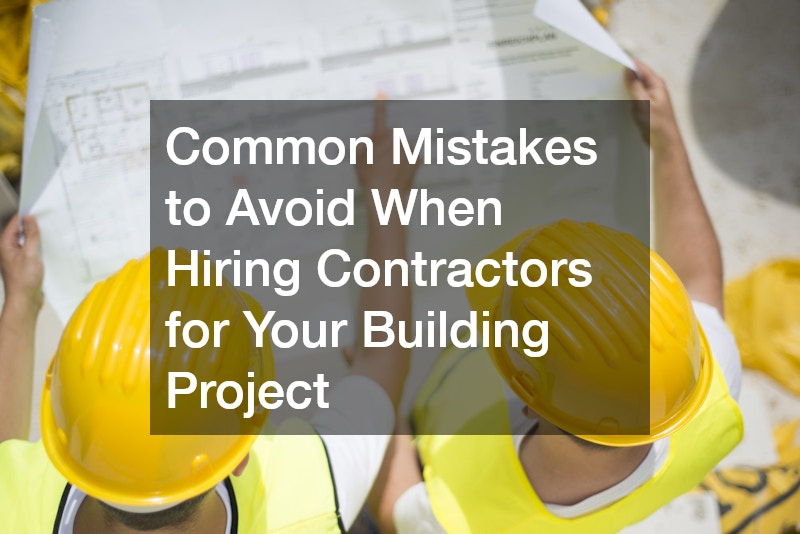Hiring contractors for a building project is one of the most important decisions a property owner can make. The success, safety, and budget of your project depend heavily on the team you assemble. Unfortunately, many construction projects experience delays, budget overruns, and even structural problems because of mistakes made during contractor selection and management.
Understanding the pitfalls and learning how to avoid them can save you time, money, and frustration. From failing to check credentials to overlooking communication and project management, there are several common errors that homeowners and project managers frequently make. By anticipating these challenges and preparing accordingly, you can ensure that your project proceeds smoothly and achieves the results you envision.
In this guide, we’ll explore the most common mistakes people make when hiring contractors and provide actionable advice for avoiding them. By following these tips, you can confidently select reliable professionals, maintain control over your project, and achieve high-quality results.
1. Failing to Verify Credentials and Licensing

One of the most critical mistakes in hiring contractors is skipping verification of their credentials. Contractors must hold proper licenses, certifications, and insurance for the work they perform. Failing to confirm these details can expose you to legal issues and substandard work.
Many property owners assume that a contractor who looks professional or has a polished website is automatically qualified. Unfortunately, appearances can be deceiving. A contractor without the proper licensing may not meet safety standards, use inferior materials, or fail to comply with local building codes.
Actionable tips for verification:
-
Check licenses online: Most states have databases where you can verify contractor licenses.
-
Ask for insurance certificates: Confirm general liability and workers’ compensation coverage.
-
Verify certifications: Some projects, such as HVAC installations or specialized ductwork, may require additional certifications.
Hiring an experienced air duct company or HVAC company without verifying credentials can result in costly repairs or unsafe installations. Even small mistakes in ductwork or HVAC systems can lead to inefficiency, higher energy bills, or air quality problems.
Key takeaway: Never assume; always confirm that a contractor is fully licensed, insured, and qualified for the specific work you need.
2. Not Clearly Defining the Scope of Work
Another common error is failing to create a detailed project plan. Many property owners rely on verbal agreements or brief descriptions, leaving room for misunderstandings. Without a clearly defined scope of work, contractors may interpret project requirements differently, leading to mistakes, delays, and added costs.
A precise scope of work should include:
-
Project specifications and dimensions
-
Material types and brands
-
Timeline and deadlines
-
Responsibilities of each contractor or trade
When hiring a framing contractor, for example, specifying the exact materials, dimensions, and design expectations ensures that the framing aligns with architectural plans. Similarly, if you hire block wall builders, you should detail the height, type of block, finishing methods, and whether additional reinforcements are needed.
Actionable tips:
-
Create a written document outlining all project tasks.
-
Include sketches, diagrams, or photos to clarify expectations.
-
Review the scope with each contractor to ensure mutual understanding.
Key takeaway: A well-defined scope of work is your safeguard against miscommunication, ensuring every contractor knows exactly what is expected.
3. Choosing Contractors Based Solely on Price
While staying within budget is important, selecting contractors based purely on the lowest bid is a common and costly mistake. Low bids may reflect limited experience, use of inferior materials, or incomplete understanding of the project.
Instead of focusing solely on cost, evaluate the value each contractor brings:
-
Experience and track record in similar projects
-
Reputation and references
-
Quality of materials and workmanship
-
Availability and ability to meet your timeline
For instance, concrete contractors often vary in quality and expertise. Choosing the cheapest option might result in weak foundations, cracking, or premature wear. Similarly, a paving company may offer a low estimate but cut corners in material quality, leading to expensive repairs later.
Actionable tips:
-
Obtain multiple bids and compare them side by side.
-
Ask for itemized estimates to understand cost breakdowns.
-
Look beyond price; consider expertise, references, and quality of past work.
Key takeaway: Prioritize value over cost. The cheapest option is not always the most cost-effective in the long run.
4. Ignoring Past Work and References

Many homeowners skip the reference check or portfolio review, which can lead to hiring contractors with poor performance histories. Reviewing past work and speaking with previous clients gives insight into the contractor’s reliability, craftsmanship, and problem-solving abilities.
When contacting references, ask questions like:
-
Was the project completed on time and within budget?
-
Were there any unexpected challenges? How were they handled?
-
How professional and communicative was the team?
If you’re hiring concrete services for specialized work or excavating businesses for groundwork, seeing examples of previous projects can reveal whether they have the experience needed for your specific site conditions and project scope.
Actionable tips:
-
Request at least 3–5 references from past clients.
-
Visit completed projects in person, if possible.
-
Look for consistency in quality and attention to detail.
Key takeaway: References and portfolios are invaluable tools for assessing whether a contractor can deliver what they promise.
5. Overlooking Communication and Project Management Skills
Effective communication and strong project management are as important as technical expertise. Poor communication can cause delays, misunderstandings, and costly mistakes. Contractors should be able to provide clear updates, respond promptly to questions, and coordinate with other trades effectively.
When evaluating a contractor’s communication skills, consider:
-
Responsiveness to calls and emails
-
Clarity in explaining processes and timelines
-
Ability to anticipate challenges and propose solutions
Contractor supply and material coordination often require frequent updates to avoid delays. Likewise, an AC company must communicate installation schedules and system requirements clearly to avoid conflicts with other trades.
Actionable tips:
-
Establish a primary point of contact for daily updates.
-
Use project management software or shared timelines for transparency.
-
Hold regular progress meetings to address concerns promptly.
Key takeaway: Good communication ensures that everyone is on the same page, reducing mistakes and improving overall project efficiency.
6. Failing to Check Insurance and Liability Coverage
Even experienced contractors can have accidents or make mistakes that cause property damage. Failing to confirm insurance coverage puts the financial responsibility on you. Always verify that contractors have:
-
General liability insurance for property damage
-
Workers’ compensation for injuries
-
Specialty insurance for high-risk work, if applicable
Hiring a reputable HVAC company or air duct company without insurance can result in unexpected costs if equipment is damaged or a worker is injured. Insurance protects both the contractor and the property owner from financial loss.
Actionable tips:
-
Request proof of insurance and verify its validity.
-
Understand policy limits and what types of incidents are covered.
-
Include insurance verification in your contract requirements.
Key takeaway: Insurance verification is a non-negotiable step that safeguards your investment and ensures accountability.
7. Not Planning for Unexpected Issues

Construction projects rarely go exactly as planned. Weather delays, material shortages, and site complications are common. Not planning for these can create costly setbacks.
Build contingency plans that include:
-
Buffer time in your schedule
-
Budget for unexpected costs
-
Clear change order procedures for modifications
For example, excavating businesses may uncover soil instability that requires additional work, or block wall builders may encounter unforeseen structural challenges. Planning ahead ensures that these issues don’t derail your project.
Actionable tips:
-
Allocate 10–20% of your budget for unexpected expenses.
-
Maintain open communication with contractors to address changes promptly.
-
Keep a flexible timeline to accommodate delays without pressure.
Key takeaway: Anticipating the unexpected helps you manage risks and maintain project momentum.
8. Skipping Written Contracts or Detailed Agreements
Some homeowners rely on verbal agreements or simple quotes. This approach is risky. Written contracts protect both parties and provide a clear record of responsibilities, timelines, and payment terms.
A comprehensive contract should include:
-
Scope of work with specific deliverables
-
Timeline and milestones
-
Payment schedule and terms
-
Material specifications and brands
-
Dispute resolution procedures
Whether hiring a framing contractor or sourcing materials from contractor supply vendors, written agreements ensure that expectations are clearly documented. They also provide legal recourse in case of disputes.
Actionable tips:
-
Always have contracts reviewed by a legal professional if the project is complex.
-
Include penalties or remedies for missed deadlines.
-
Keep signed copies accessible to all parties.
Key takeaway: Written contracts are essential for clarity, accountability, and legal protection.
9. Neglecting Material Quality and Supplier Reliability
Even skilled contractors cannot compensate for low-quality materials. Using unreliable suppliers or substandard materials can compromise structural integrity, aesthetics, and durability.
Evaluate suppliers and materials carefully. For instance:
-
Concrete contractors need high-quality mix designs suited for specific applications.
-
Concrete services should be inspected for consistency, curing, and finishing standards.
Check:
-
Material certifications and warranties
-
Supplier reputation and reliability
-
Past projects demonstrating material performance
Actionable tips:
-
Inspect delivered materials before installation.
-
Verify that suppliers can meet project demands in quantity and quality.
-
Discuss preferred brands or specifications with your contractors ahead of time.
Key takeaway: High-quality materials from trusted suppliers are as critical as skilled labor for a successful project.
10. Not Establishing a Clear Payment Schedule

Payment disputes are a major source of tension in construction projects. Without a clear schedule, contractors may delay work or homeowners may withhold payments unnecessarily.
Best practices for payment include:
-
Tying payments to completed milestones rather than arbitrary dates
-
Using escrow accounts or third-party verification for larger projects
-
Avoiding full upfront payments; limit deposits to 10–20%
A reliable paving company or AC company will agree to milestone-based payments tied to tangible progress. This protects both parties and motivates contractors to stay on schedule.
Actionable tips:
-
Break the project into stages and define corresponding payments.
-
Include payment terms in the contract with clear expectations.
-
Keep records of all transactions and approvals.
Key takeaway: Clear, milestone-based payment schedules prevent disputes and maintain project momentum.
Hiring contractors is one of the most important steps in any building project. Mistakes in contractor selection, communication, or planning can lead to delays, unexpected costs, and substandard results. By verifying credentials, clearly defining the scope, checking references, planning for contingencies, and documenting agreements, property owners can protect their investment and ensure high-quality outcomes.
Avoiding these common pitfalls allows you to assemble a team of skilled professionals who communicate effectively, use quality materials, and adhere to project timelines. With careful planning, proactive management, and a focus on value over cost, your building project can be completed efficiently, safely, and successfully.
Take the time to vet your contractors, establish clear expectations, and prepare for the unexpected—you’ll save money, reduce stress, and achieve results that last for years to come.
